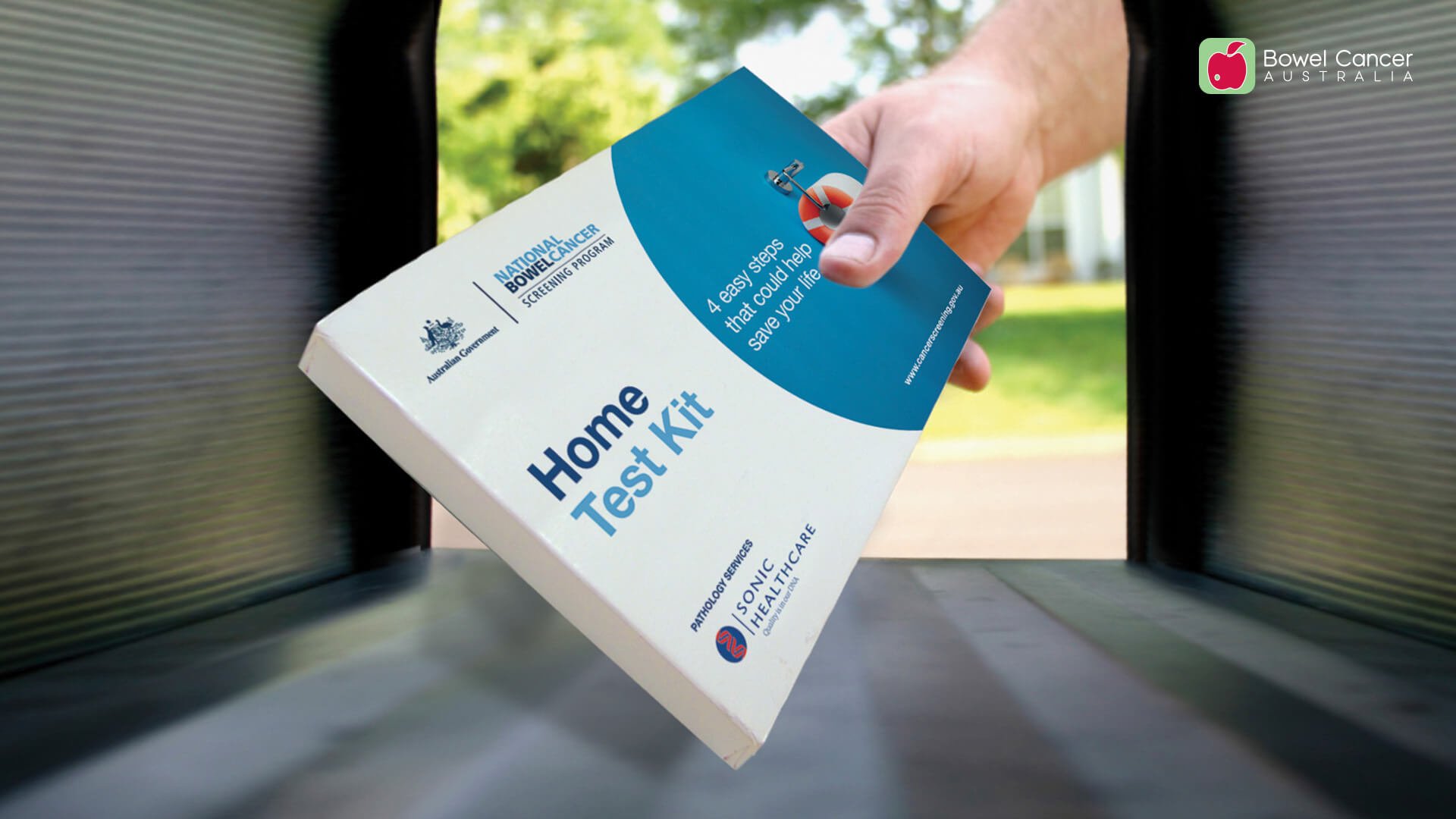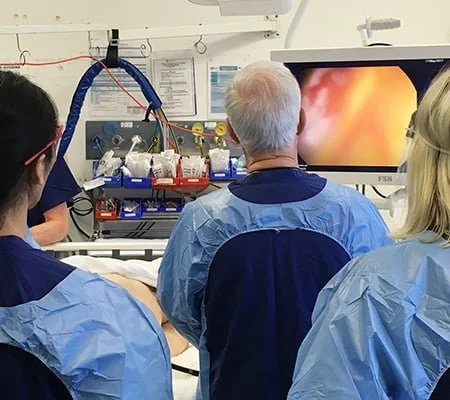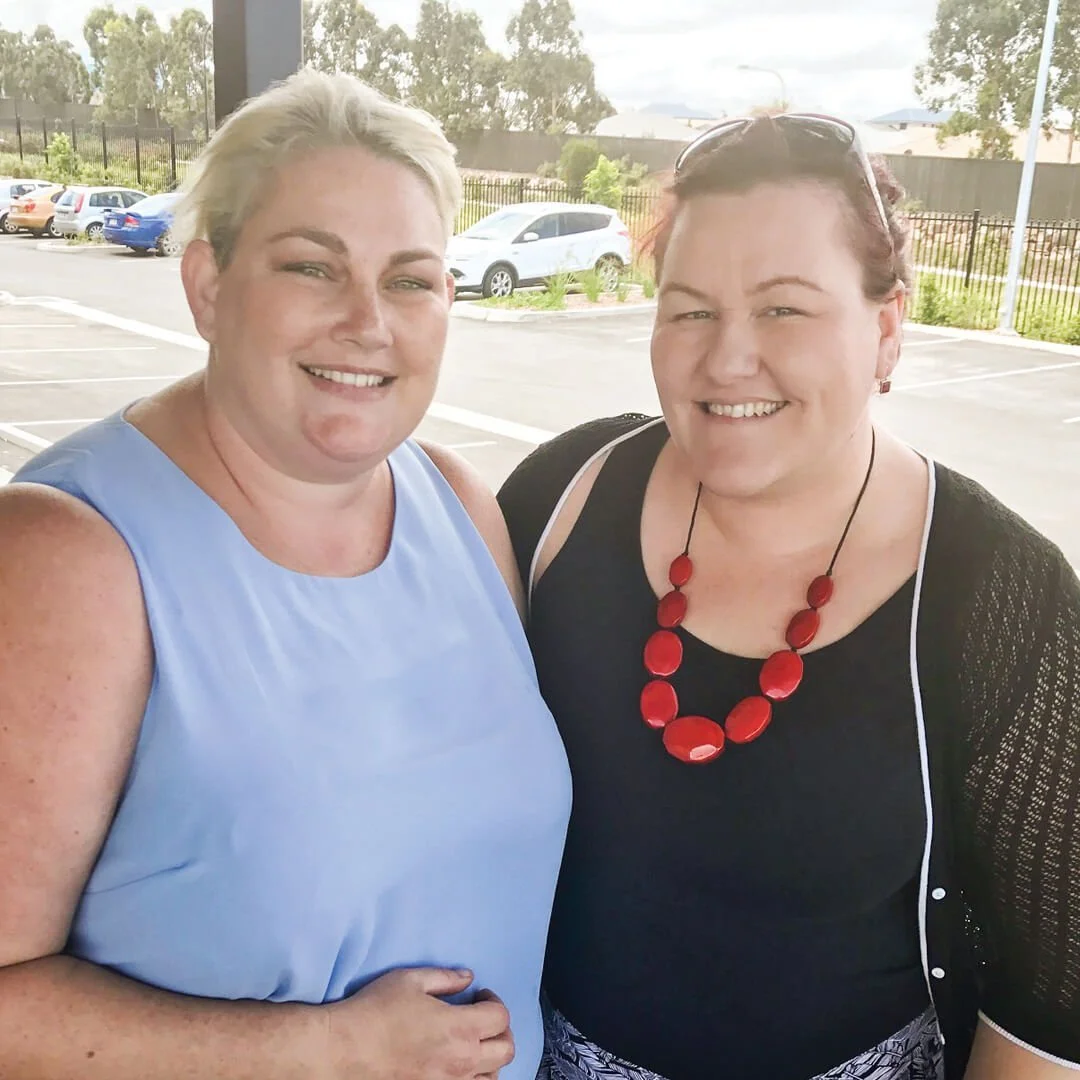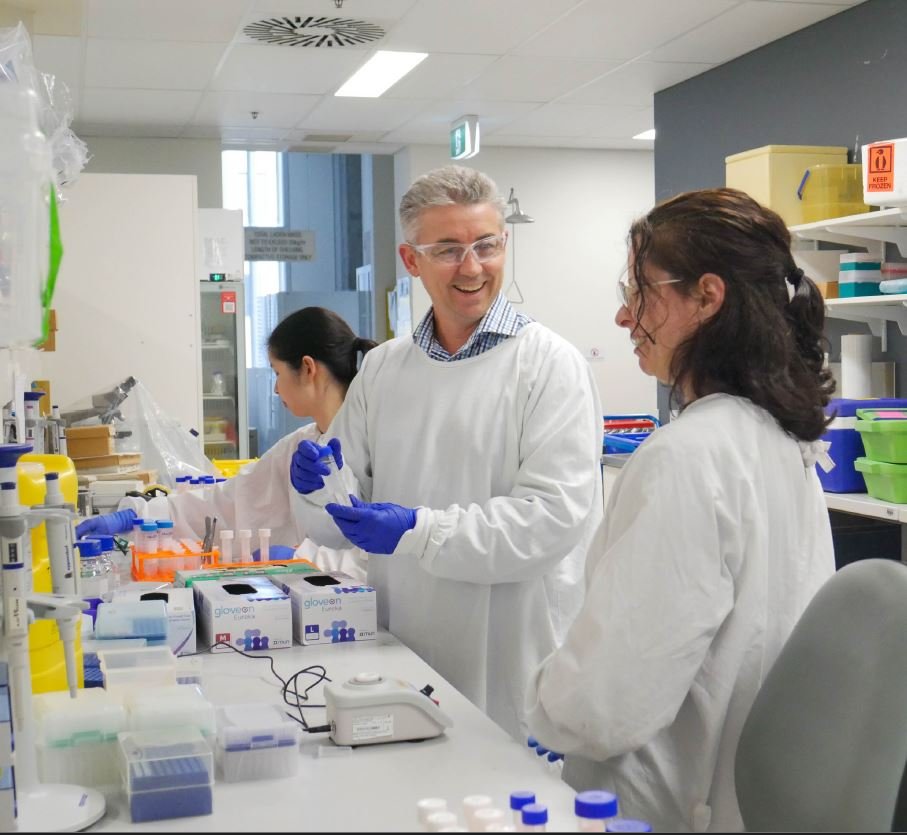
With your support we’re making an impact!
Bowel Cancer Australia is dedicated to championing what matters most to people impacted by bowel cancer and empowering everyone affected to live their best life.
In 2024, Bowel Cancer Australia made bold strides towards the elimination of Australia’s second deadliest cancer - turning advocacy into action, awareness into meaningful change, research into life-saving breakthroughs, and overcoming inequities in bowel cancer care with responsive patient support.
Thanks to the unwavering commitment and dedication of our supporters, fundraisers, advocates and partners, we made a lasting impact across the care continuum, with a view to ensuring no Australian faces bowel cancer alone.
With your ongoing support, Bowel Cancer Australia will continue to lead, championing what matters most to people impacted by bowel cancer.
2024 marked a pivotal moment in our long-running campaign to expand access to bowel cancer screening.
From July 1, the National Bowel Cancer Screening Program age was lowered from 50 to 45 years – a direct result of our persistent advocacy over the past six years. This critical milestone means an additional 1.6 million Australians can now access free, at-home screening tests, improving early detection and saving lives.
We amplified our voice in the halls of Federal Parliament with the launch of the Parliamentary Friends of Bowel Cancer in March, co-chaired by Steve Georganas MP and the Hon Dr David Gillespie MP, which cemented a crucial, non-partisan forum dedicated to policy reform and support for bowel cancer patients.
This was further strengthened by our annual preeminent advocacy event, Call on Canberra, where advocates shared their lived experiences, strongly urged policymakers to address age bias in diagnosis, called for prompt access to colonoscopy, and increased funding into the causes of early-onset bowel cancer.
We launched the Never2Young CPD Series, which provides GPs with accredited training to combat age bias and improve early diagnosis for younger patients. This is an important series as young Australians often face delays in recognition of their symptoms.
Research took centre stage with Bowel Cancer Australia co-hosting the inaugural Early-Onset Bowel Cancer Research Symposium in November. This pioneering event, held in collaboration with Associate Professor Daniel Buchanan, brought together leading experts to develop an Early-Onset Bowel Cancer Research Roadmap and Action Plan.
2024 marked the sixth anniversary of Professor Mark Molloy’s appointment as the Lawrence Penn Chair of Bowel Cancer Research. During the year, Professor Molloy was successful in securing competitive funding totaling $1.96 million.
The University of Sydney’s partnership with Bowel Cancer Australia through the Lawrence Penn Chair provides a vital platform for accelerating global efforts to reduce the burden of bowel cancer through pioneering research.
In addition, we awarded a $600,000 research grant to Professor Michael Samuel and his team to investigate the role of the Rho-associated kinase (ROCK) protein in early-onset bowel cancer progression. This grant will forge a major step toward new treatment strategies in bowel cancer.
In June, we expanded our Specialist Bowel Care Nurse program in collaboration with Icon Cancer Centre, which saw the placement of dedicated nurses in key locations across Australia.
Since 2011, Bowel Cancer Australia has provided a well-established specialist telehealth support service tailored to the unique needs of people impacted by bowel cancer throughout the country.
During the year, the Australian Government engaged Bowel Cancer Australia to leverage and expand the Charity’s specialist telehealth services through the Australian Cancer Nursing and Navigation Program by funding an additional 6 full-time equivalent (FTE) positions over the next three years.
Our Australia’s Deadliest campaign shook public perception by exposing bowel cancer as a silent predator affecting over 1,700 Australians under 50 years of age each year. Through powerful lived-experiences, we challenged the misconception that bowel cancer is an “old man’s disease” and underscored the urgency of early detection.
Beyond traditional campaigns, we embraced bold and unconventional initiatives throughout the year.
Our new collaboration with Kleenex® helped break the “poo taboo,” through bathroom media advertising at major shopping centres, with more initiatives planned for 2025.
Irregular Chocolates, a Valentine’s Day collaboration with artist and chef Ryan L Foote, transformed bowel cancer symptoms into edible works of art and sparked much needed and meaningful conversations around early detection.
Our impact was widely recognised throughout the year with Bowel Cancer Australia named a finalist in two prestigious awards: the PRIME Awards (Best Public Health Initiative for Australia’s Deadliest campaign) and the Health Industry Hub Catalysts for Change Awards (NGO of the Year). These honours reflect the power of our collective voice and the meaningful change we continue to drive across the care continuum.
Through every milestone, every breakthrough, and every powerful lived-experience shared, 2024 was a year of undeniable progress.
But our work is far from over - with rates of early-onset bowel cancer rising, the need for greater awareness, prompt diagnosis, tailored support and research discoveries are more pressing than ever.
Thank you for your ongoing support.
Craig M Jackson
Chairman
Julien Wiggins
CEO

Timeline of events & our achievements
Bowel Cancer Australia is the trusted national voice on bowel cancer, championing what matters most to people affected by bowel cancer.
Our financial independence affords us the freedom to be a dissenting voice as required and has enabled us to invest in priorities that lead to meaningful change, influence public policy, engage more people in life-saving conversations, focus support on patients’ needs, and fund vital research.
Click here to view the timeline of events and our achievements.
A decade of impact in numbers

Our strong, clear, and purposeful vision and mission; engagement of stakeholders through innovative and unique marketing initiatives; impactful collaborations that drive organisational purpose; and design of solutions based on system-level change were all cited as reasons why we were chosen as the inaugural recipient.
We were also recognised as the NGO of the Year for excellence in commitment and success in a health-focused mission (Australia Doctor Group PRIME 2017); honoured for Excellence in Patient/Customer Support following the release of the bowel cancer app (PRIME 2016); and received the Corporate Social Responsibility Award for the My Cancer, My Voice campaign (PRIME 2014).
In addition, our dynamic campaigns that raise awareness, challenge perceptions and motivate action have been consistently recognised by the commercial advertising industry, including PRIA National Golden Target Awards; ADMA Creativity & Effectiveness Awards (AC&E); as well as Siren Awards.
Awards
The groundbreaking work of Bowel Cancer Australia’s ambassadors and advocates is highly regarded. Turning science and statistics into something people can understand and care about, Advocate Stephanie Kaye (2014), Ambassador Erin Molan (2015), Spokesperson Amanda Richardson (2015), and Advocate Stephanie Bansemer-Brown (2021) have all been honoured by the Colorectal Surgical Society of Australia and New Zealand (CSSANZ) and commended for their contributions.
Bowel Cancer Australia was awarded Best Small Charity of the Year 2019 at the Third Sector Awards in recognition of our contribution to the third sector in a meaningful and impactful way that produces measurable benefits.
In 2022, Bowel Cancer Australia’s Medical Director, A/Prof Graham Newstead AM, was awarded an Honorary Fellowship of the American College of Surgeons (ACS).
Individuals selected for Honorary Fellowship generally practice outside of the United States, possess an international reputation in the field of surgery or medicine, and have provided distinguished humanitarian service in the field of medical science.
In 2024, Bowel Cancer Australia was named a finalist in two prestigious awards:
The Australian Doctor Group (ADG) PRIME Awards – Best Public Health Initiative for the Australia’s Deadliest campaign. This award recognised our innovative and impactful approach to raising awareness of bowel cancer as the second deadliest cancer in Australia and the importance of early detection.
The Health Industry Hub Catalysts for Change Awards – NGO of the Year. This award acknowledged our dedication to advocating for improved patient outcomes, increasing public awareness, and driving policy change to support bowel cancer prevention and treatment.
Bowel cancer is a
leading cause of underlying death for Australians aged 25-84

Over the past 24 years bowel cancer incidence rates have decreased more than any other cancer
The most significant decreases of bowel cancer incidence rates this century coincided with the introduction of the National Bowel Cancer Screening Program.
Bowel Cancer Australia continued monitoring the impact on diagnosing Australia’s second deadliest cancer.
Colonoscopy waitlists that existed prior to COVID-19 were compounded due to the pandemic, increasing the risk for bowel cancer progression and mortality. Bowel Cancer Australia continued to explore and advocate practical solutions to address colonoscopy waitlists.
Help make real change happen!
There are many ways you can get involved and help beat bowel cancer.
Learn how at bowelcanceraustralia.org
What did we do? Year in Review
We challenged perceptions, raised awareness, and motivated action through dynamic campaigns.

Call On Canberra: Advocating for change
On Monday June 24, Bowel Cancer Australia’s annual Call on Canberra returned to Parliament House, Canberra, with a key goal of uniting advocates from across the country in a powerful push for policy change.
With early-onset bowel cancer rates rising at an alarming rate, the message for Call on Canberra 2024 was clear: age should never be a barrier to diagnosis.
Throughout the day, advocates met with key MPs and Senators, sharing powerful lived experiences and championing urgent policy priorities, including:
Addressing delays in diagnosis by increasing awareness among primary care providers and improving referral pathways.
Expanding access to screening by advocating for the implementation of the new recommended start age of 40.
Ensuring faster access to colonoscopy services in the public health system to meet clinically recommended wait times.
The impact of Call on Canberra continues to grow, with the launch of the Parliamentary Friends of Bowel Cancer, new research collaborations, and extensive policy wins, such as lowering the National Bowel Cancer Screening Program age to 45 years, progress is undeniable.
However, there is still more work to be done. Bowel Cancer Australia remains steadfast in its advocacy, ensuring early-onset bowel cancer remains a national priority.
Launch of the Parliamentary Friends
of Bowel Cancer
In March, Bowel Cancer Australia, alongside co-chairs Steve Georganas MP
and the Hon Dr David Gillespie MP, launched the Parliamentary Friends of
Bowel Cancer.
This non-partisan forum is dedicated to raising awareness and driving
action on one of Australia’s most pressing health challenges.
Through this forum, Bowel Cancer Australia advocated for:
Investment in primary care to reduce age bias in diagnosis
Lowering the bowel cancer screening age to 45, in line with updated guidelines
Increased funding for colonoscopy services to meet clinically recommended wait times.
With a united voice in Parliament, this forum is a crucial step toward
improving outcomes and ensuring no Australian faces bowel cancer alone.

Advocacy Network
Patients feel they have the 'wrong cancer' due to a lack of dedicated support services and low awareness of the disease.
Help shift public perceptions and shape healthcare policies that affect over 160,000 people living with or beyond bowel cancer at a state/territory and federal level.
If not you, then who?

A breakthrough in bowel cancer screening
After six years of consistent and dedicated advocacy, Bowel Cancer Australia achieved a major milestone on July 1, with the announcement that the National Bowel Cancer Screening Program (NBCSP) age would be officially lowered from 50 to 45 years of age.
This life-saving change now makes 1.6 million Australians aged 45-49 eligible for a free, at-home screening test.
Bowel cancer is Australia’s second deadliest cancer, with rates in younger Australians rising over the past three decades.
One in nine new cases occur in people under 50 years of age, with those aged 40-49 accounting for 56% of diagnoses and 64% of deaths in early-onset cases.
Aged 40-44?
-
Medical guidelines state health care professionals could consider offering an immunochemical faecal occult blood test every 2 years to people aged 40-44, who request screening following a discussion about the benefits and potential harms.
Screening through the NBCSP lowers the risk of dying by 40% compared to those who are not screened.
The at-home test detects hidden blood in the stool, which prompts further investigation via a colonoscopy.
Canberra fitness instructor Yvette Adams, diagnosed with stage 3 bowel cancer at 47, said: "If I had an option to screen earlier, my cancer might have been caught before it reached stage three."
Bowel Cancer Australia thanks the dedicated and passionate advocates and Parliamentary Friends of Bowel Cancer for championing this campaign.
Aged 45-74?
-
For people at average risk of bowel cancer and without symptoms, medical guidelines recommend screening using a faecal immunochemical test (FIT) every 2 years between ages 45-74.
Aged 75-85?
-
Medical guidelines state health care professionals could consider offering an immunochemical faecal occult blood test to fit, well and healthy people aged 75-85 years, who request screening after a discussion about the benefits and potential harms.

BowelScreen Australia
providing people who want to screen, but not eligible to participate in the National Bowel Cancer Screening Program, the opportunity to do so.

Colonoscopy wait-times
We continue to advocate for colonoscopy within 30 days from first healthcare presentation for people experiencing bowel cancer symptoms or a positive screen, because when detected early, nearly 99% of bowel cancer cases can be successfully treated.
Wait times for those who received a NBCSP positive screen varied between 133 and 197 days depending on where participants lived.
Only 13.5% of participants with a positive screen received their colonoscopy within the recommended 30 days.
The ‘Patient Access Gap’
The Patient Access Gap refers to the time in days patients must wait between the date a medicine is authorised for use in Australia (TGA approved/ARTG listed) and the date that it is listed on the PBS and affordably available.
Bowel cancer patients have experienced some of the longest waits, with one life-extending medication taking more than six years and a record eight submissions before being listed on the PBS as a subsidised treatment.
Cancer treatment is time sensitive, and many patients don’t have time to wait.
Bowel Cancer Australia advocates for immediate affordable access following Therapeutic Goods Administration (TGA) approval of a medicine, so patients can benefit from life-saving and life-extending treatments sooner, while the Pharmaceutical Benefits Advisory Committee (PBAC) processes and price negotiations continue.
We continue horizon scanning for new treatment options approved overseas, advocating for them to be indicated and subsidised for patients in Australia.
Awareness with impact
Australia's Deadliest:
Bowel cancer campaign
shakes up perceptions and sparks urgent action.
Bowel Cancer Australia’s Marketing and Publicity Manager and a bowel cancer survivor herself, Stephanie, emphasised the campaign’s critical mission: “Younger people are dying from a disease that is 99% treatable when caught early, yet awareness remains low. This campaign aims to change that – to cut through the noise and ensure early-onset bowel cancer has a voice that truly resonates.”
The campaign’s execution, crafted with the expertise of AIRBAG Productions, extended across TV, digital, outdoor, social media, print, and radio ensuring its urgent message reached Australians far and wide.
With Australia’s Deadliest, Bowel Cancer Australia is not only challenging perceptions but also empowering more people to recognise red flag signs and symptoms, take action to help save lives.
Watch the campaign video here. Or want to hear how Australia’s Deadliest came to life? Listen to The Bottom Line podcast, featuring Ogilvy’s Nina East, AIRBAG’s Eddy Bell, and bowel cancer survivor Kin Leong as they discuss the campaign’s impact.
Bowel Cancer Australia launched its boldest awareness campaign yet, Australia’s Deadliest, to challenge perceptions and spark urgent conversations about early-onset bowel cancer.
Developed in partnership with Ogilvy Health, the campaign took a strikingly unconventional approach, borrowing the language and imagery of tabloid journalism to expose the devastating reality of Australia’s second deadliest cancer.
Through gripping real-life accounts, the campaign personified bowel cancer as a lethal predator, preying on over 1,700 Australians under 50, each year.
At the heart of the campaign were five courageous individuals – Nina, Jake, Rachel, Kin, and Anthony – who shared their lived experiences to dismantle the myth that bowel cancer is an "old man’s disease." Their powerful testimonies, combined with bold headlines and compelling visuals, served as a wake-up call to Australians of all ages: know the symptoms, act early and take bowel cancer seriously.
Bowel Cancer Australia was mentioned in over 377 news stories, reaching more than 14.2 million people, during our signature awareness and fundraising event, Bowel Cancer Awareness Month, in June.

Red Apple Day -
Our Annual Giving Day
A record-breaking show of support. A crucial cause. A step closer to a cure.
On June 19, Australians once again united for Red Apple Day, which is Bowel Cancer Australia’s Annual Giving Day. In 2024, Bowel Cancer Australia raised more than $260,000 – a significant increase from previous years – on Red Apple Day.
This remarkable result highlights the growing awareness and urgency of early-onset bowel cancer.
Every dollar raised will drive high-impact research, expanding knowledge, improving treatments, and ultimately paving the way toward a cure.
A heartfelt thank you to everyone who donated, fundraised, and championed the cause, as well as to the MPs, Senators, and community leaders who helped amplify the message nationwide. Special thanks to Matt Cross MP, Chris Crewther MP, Donna Hope, and other Parliamentarians for recognising Red Apple Day and advocating for Bowel Cancer Australia.
Bowel Cancer Australia’s apple logo remains a powerful symbol of hope—just as detecting a worm early can save an apple, bowel cancer is 99% treatable when caught early.
Breaking the poo taboo
Kleenex® teamed up with Bowel Cancer Australia for symptom awareness.
In October, Bowel Cancer Australia joined forces with Kleenex® to challenge the poo taboo and raise awareness about the bowel cancer detection of bowel cancer.
This groundbreaking collaboration encourages Australians to take charge of their bowel health and recognise symptoms as nearly 99% of bowel cancer cases can be successfully treated when detected early.
At the heart of the campaign was a deeply personal story shared by Elise, highlighting the profound impact of bowel cancer on individuals and their loved ones.
Through a heartfelt video, Elise shared her lived-experience, encouraging Australians to break the silence around bowel cancer and recognise the importance of early detection.
Her story became a powerful extension of the campaign, reinforcing the message that love isn’t just about romance – it’s about caring for your health and the health of those around you.
Valentine’s Day looked a little different at Bowel Cancer Australia.
In February, Bowel Cancer Australia redefined the meaning of love with a bold and unexpected collaboration – Irregular Chocolates, created in partnership with artist, chef and food designer Ryan L Foote.
Designed to spark an unconventional, yet critical conversation, this limited-edition chocolate collection transformed four key bowel cancer symptoms into bespoke, 3D-designed confections.
With his signature flair for visually striking and innovative creations, Ryan carefully crafted each chocolate, offering both an exquisite flavour experience and a thought-provoking message.
Irregular Chocolates:
An unconventional
conversation

Collaboration.
We collaborated with peak bodies, patient/consumer and healthcare organisations as well as industry, nationally and internationally. The value of collective voice and shared commitment to patient-centred care helps amplify our efforts in championing what matters most to people affected by bowel cancer.
We provided practical and emotional support and built communities through shared, lived experiences.
Never2Young CPD series: Tackling age bias in early-onset bowel cancer
The Never2Young CPD series provides healthcare professionals with up to 19 CPD hours, including interactive virtual clinics based on patient-lived experiences. The program equips healthcare professionals with the tools to:
Identify red flag symptoms and risk factors in younger adults
Promptly refer for further investigation
Promote updated screening guidelines to improve early detection.
With over 1,700 Australians under 50 diagnosed annually, bowel cancer remains the deadliest cancer for Australians aged between 25-44.
In June, Bowel Cancer Australia launched the Never2Young CPD series, a RACGP, ACRRM, Pharmacist and Emergency Physician-accredited educational initiative designed to help healthcare professionals recognise early-onset bowel cancer and overcome age bias.
Research shows younger patients may spend between three months and five years seeing multiple doctors before receiving a diagnosis, often making 10 or more GP visits before being referred for further investigation.
The time to diagnosis is 60% longer for early-onset bowel cancer patients, increasing the risk of late-stage detection and the need for more aggressive treatment. Alarmingly, the risk of bowel cancer diagnosis before the age 40 has more than doubled since 2000.
Diagnosed with the ‘wrong cancer’
“I felt invisible. While other patients had access to nurse support,
I was left to deal with my disease alone.” ~ Steff
Closing the care gap: Bowel Cancer Australia and Icon Cancer Centre collaboration
In June, Bowel Cancer Australia and Icon Cancer Centre took a major step toward improving patient care by placing specialist Bowel Care Nurses in Revesby (NSW), Mackay (QLD), Windsor Gardens (SA), and Hobart (TAS). This initiative delivers expert, in-person support where it’s needed most –closer to home.
More than just medical professionals, Bowel Care Nurses are a lifeline – providing critical care coordination, emotional support, and expert guidance to help patients navigate the complexities of treatment. Yet, despite 83% of bowel cancer patients identifying specialist nurse access as crucial, fewer than one in three have a dedicated care coordinator.
“Access to a specialist nurse by phone or in-person has been identified by more than eight in ten (83%) bowel cancer patients as an important resource to improve their care coordination,” Bowel Cancer Australia CEO Julien Wiggins said.
As Australia’s second deadliest cancer, bowel cancer demands action. By bridging the care gap, this partnership is ensuring more Australians receive the compassion, advocacy, and life-changing support they deserve.
Providing Specialist Support Services
Australian Cancer Nursing & Navigation Program
In November 2023, the Australian Government announced an additional investment of $166.1 million over four years in more cancer nurses and additional care for patients through the Australian Cancer Nursing and Navigation Program (ACNNP), including $36.4 million over four years for telehealth support services delivered by non-government cancer organisations.
The ACNNP aims to improve equitable access to high quality, multidisciplinary and integrated cancer services for all people with cancer, irrespective of their type of cancer or where they live.
Since 2011, Bowel Cancer Australia has provided a well-established specialist telehealth support service tailored to the unique needs of people impacted by bowel cancer throughout the country.
In 2024 the Australian Government engaged Bowel Cancer Australia to leverage and expand the Charity’s specialist telehealth services through the ACNNP, by funding an additional 6 full-time equivalent (FTE) positions.
We empowered people with the tools and knowledge to be advocates for their own health and give real meaning to the term ‘patient-centred care’.
We invest in research that has the
potential to improve survival and
builds a path towards a cure.

Inaugural Early-Onset Bowel Cancer Research Symposium
At the heart of the discussions was the patient voice, ensuring that lived experiences guide research priorities and improve real-world outcomes. Experts also collaborated to shape the Early-Onset Bowel Cancer Research Roadmap and Action Plan, a blueprint for accelerating progress in understanding, treating, and ultimately preventing the disease.
As the trusted national voice on early-onset bowel cancer, Bowel Cancer Australia continues to lead the charge through its #Never2Young Advocacy Agenda, pushing for breakthrough research, better care experiences, and improved survival rates for younger Australians affected by bowel cancer.
This symposium marks a significant step forward in the fight against early-onset bowel cancer, fostering collaboration, advancing research, and building a path toward a cure.
In November 2024, Bowel Cancer Australia, in partnership with Associate Professor Daniel Buchanan from the University of Melbourne, co-hosted the inaugural Early-Onset Bowel Cancer Research Symposium. This is a national, multidisciplinary event focused on transforming early-onset bowel cancer research and care.
With early-onset bowel cancer rates rising at an alarming rate, the symposium brought together leading experts to prioritise research, identify gaps, and drive innovation across key areas, including:
Biology and aetiology of early-onset bowel cancer
Prevention, early detection, and treatment strategies
Survivorship, recurrence, and patient-centred care.

Driving bowel cancer discoveries
Professor Molloy was featured in the 2024 revision of Stanford University’s Top 2% Scientists list, which recognises researchers based on their publication track record and impact in their respective fields.
Sixth year of Professor Mark Molloy’s appointment as the Lawrence Penn Chair of Bowel Cancer Research.
The University of Sydney’s $10.4 million partnership with Bowel Cancer Australia provides a vital platform for accelerating global efforts to reduce the burden of bowel cancer through pioneering research.
Professor Mark Molloy and his team of talented scientists continue to pursue a range of exciting research projects to unlock discoveries that could improve patient outcomes.
In 2024, Professor Molloy was successful in securing competitive funding totaling $1.96 million.
Click here for a full list of research publications.
Research highlights
-
The research team completed whole exome DNA sequencing of early bowel polyps to determine the average number of mutations per polyp as bowel cancers have a higher average mutational burden.
The team observed some polyps could possess large mutational burdens despite their small size – a previously unknown finding as it had been assumed small polyps would have low mutational burdens. These findings may help explain why bowel cancers occur between surveillance colonoscopy intervals.
-
Little is known regarding the immune cells present in early bowel polyps. The research team observed an increased density of T-cells in polyps compared with healthy tissue. This information will form the basis of further study to understand how specific immune cells contribute to bowel polyp growth and whether manipulating their presence could help prevent growth.
-
Most research studies have focused on the microbiome from patient stool, whereas the research team focused on the microbiome associated with bowel polyps. The team discovered oral bacteria found in patients with bowel polyps which was not present in people without bowel polyps. A similar finding has been reported for bowel tumours, so the team is eager to continue researching the pre-cancer association.
-
The research team completed a proteomic and genomic analysis of colorectal (bowel) liver metastasis (CRLM) from patients with early recurrence as well as people living beyond bowel cancer following liver surgery.
The research team continues to collaborate with German colleagues to establish an international CRLM proteomic map, which Professor Molloy anticipates will be the first large-scale, international proteomic study of CRLM.
New research grant awarded to investigate early-onset bowel cancer
In April, Bowel Cancer Australia awarded a $600,000 research grant for Professor Michael Samuel and his team at the Centre for Cancer Biology and the Basil Hetzel Institute.
This grant, via Cancer Australia’s Priority-driven Collaborative Cancer Research Scheme (PdCCRS), will drive pioneering research into early-onset bowel cancer.
The team’s focus will be on ROCK, a protein that controls cell movement and shape but goes into overdrive in bowel cancer, accelerating tumour growth and spread. By exploring how ROCK influences cancer cells’ ability to communicate with healthy cells, this research aims to uncover vital mechanisms behind cancer progression, metastasis, and recurrence.
With one in nine new cases of bowel cancer occurring in people under 50 years of age, and higher rates of metastasis in this age group, the project aims to develop new ways to predict and prevent cancer recurrence.
Professor Samuel stated, “People diagnosed with early-onset bowel cancer have a 50% chance that their cancer will recur or spread to other organs following initial intervention (e.g. surgery to remove the primary cancer), compared to around 30% in people diagnosed with late-onset bowel cancer.”
Gut bacteria and the rising rates of early-onset bowel cancer
As early-onset bowel cancer rates continue to rise among younger Australians, emerging research suggests that gut bacteria could be a contributing factor. A 9News report, in March highlighted the growing body of evidence linking the gut microbiome to the development of bowel cancer in people under 50 years of age.
Associate Professor Daniel Buchanan from the University of Melbourne is leading research into how gut bacteria may influence the rising rates of early-onset bowel cancer. His work explores how changes in the microbiome might contribute to tumour growth and inflammation, potentially increasing the risk of cancer development.
We raised funds to continue our life-saving work and inspired others to do the same

Thank you to our
sponsors and supporters
We work hard to maximise every dollar donated goes to driving our advocacy, awareness, support and research initiatives so as to deliver the greatest potential benefit for people living with and beyond bowel cancer and their loved ones.
Our dedication to efficiency and accountability has always been a core value of Bowel Cancer Australia and continues to underpin everything we do.
Gross Income
Donations and bequests: $3,613,698.00
Revenue from providing goods or services: $214,399.00
Revenue from government including grants: $0.00
Revenue from investments: $281,168.00
All other revenue: $27,014.00
Total revenue: $4,136,279.00
Other income (for example, gains): $271,347.00
Total gross income: $4,407,626.00
Expenses
Employee expenses: $804,518.00
Interest expenses: $19,884.00
Grants and donations made for use in Australia: $215,000.00
Grants and donations made for use outside Australia: $0.00
All other expenses: $2,472,167.00
Total expenses: $3,511,569.00
Net surplus/(deficit): $896,057.00
Other comprehensive income: $0.00
Total comprehensive income: $896,057.00
Assets
Total current assets: $9,562,983.00
Non-current loans receivable: $0.00
Other non-current assets: $407,798.00
Total non-current assets: $407,798.00
Total assets: $9,970,781.00
Liabilities
Total current liabilities: $1,559,131.00
Non-current loans payable: $0.00
Other non-current liabilities: $253,916.00
Total non-current liabilities: $307,169.00
Total liabilities: $1,813,047.00
Net assets/liabilities: $8,157,734.00
Gross Income
Donations and bequests: $20,588.00
Revenue from providing goods or services: $0.00
Revenue from government including grants: $0.00
Revenue from investments: $11,173.00
All other revenue: $0.00
Total revenue: $31,761.00
Other income (for example, gains): $1,785.00
Total gross income: $33,546.00
Expenses
Employee expenses: $0.00
Interest expenses: $0.00
Grants and donations made for use in Australia: $254,918.00
Grants and donations made for use outside Australia: $0.00
All other expenses: $9,950.00
Total expenses: $264,918.00
Net surplus/(deficit): -$231,322.00
Other comprehensive income: $0.00
Total comprehensive income: -$231,322.00
Assets
Total current assets: $355,623.00
Non-current loans receivable: $0.00
Total assets: $355,623.00
Liabilities
Total current liabilities: $0.00
Total non-current liabilities: $0.00
Total liabilities: $0.00
Net assets/liabilities: $355,623.00

















































